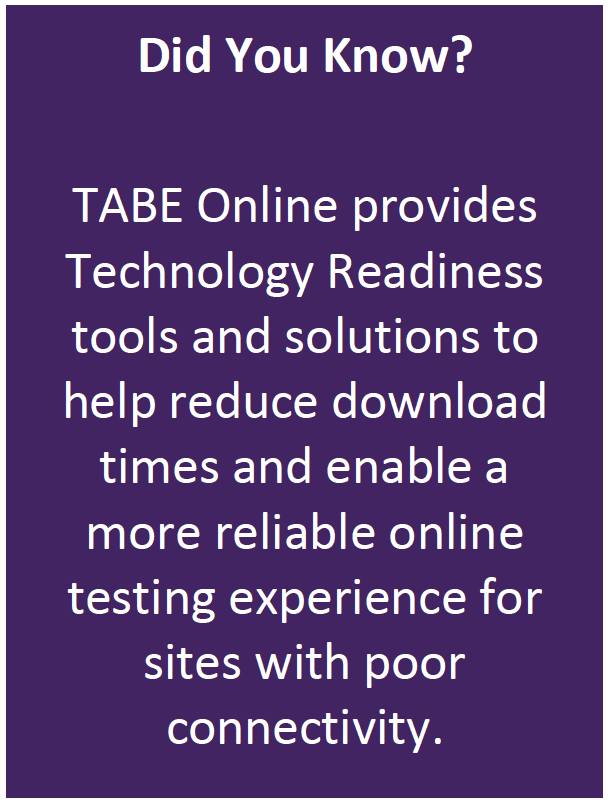Fall classes are in full swing at adult education centers across the country, and many are using the new TABE® 11&12. We checked in with Ginger Hilleary, Program Manager at the Piedmont Regional Adult and Career Education Programs (PRACEP) in Virginia, to get her insight on using TABE 11&12.

Can you tell us a little bit about your programs and the services you provide?
PRACEP provides a variety of services including our high school equivalency program, English as a Second Language (ESL) program, distance education, and PluggedInVA. Our main office is in Locust Grove, Virginia, but we have satellite sites in five different counties. We also serve parole and probation and a local adult corrections center.
How long have you been using TABE?
Prior to my current role at PRACEP, I was the director of a literacy program where we used TABE for 14 years. We have been using TABE for the last four years at PRACEP. So in total, I’ve been using TABE for about 18 years.
How do your programs use TABE?
We use the TABE assessment as a doorway into our programs. TABE helps us determine what level learners are when they enter the program so we can appropriately place them into a class. We also use TABE to determine readiness to take the high school equivalency exam. For non-native speakers, TABE helps us determine reading comprehension and speaking ability in order to be placed in an ESL bridge class. We also use TABE for post-testing after learners complete the prescribed number of hours or indicate a readiness for HSE testing.
Let’s talk about the new TABE 11&12. When did you first start using it?
We piloted TABE 11&12 with our adult corrections center in February/March of 2019. That was our first experience with it and we really were able to see what a valuable instrument it is.
What advantages have you seen with the new TABE 11&12?
It drills down in more detail and helps us really understand and define what learners bring to the table. The diagnostics are tremendously helpful to us. The questions cover the gamut of what a learner would need to know for a given grade level. It’s just a much more comprehensive instrument.

Do you administer the test on paper or online?
At this time, we only administer on paper because so much of our area has poor connectivity. We’re a fairly rural program, so connectivity is an issue for us. In addition, with the sometimes sporadic nature of our learners and their attendance, we’ve found paper to be a much better option for us.
We continue to offer advancements that address connectivity issues in rural locations to ensure they can test online reliably. Is that something that would interest you?
My intake staff would love that. They would really love to have that online availability.
What successes have you seen with using the new TABE 11&12?
It is impressive. We are just now getting back into classes for the fall, so we’re starting to use it regularly for pre-testing in our programs. We’ve noticed that the potential for mistakes has gone down quite a bit because of how the new test is laid out with a lot more blank space. It’s easier for our learners to use.

What would you say to other programs that might be considering using TABE 11&12? I would encourage them to use it. It’s an instrument that’s accepted all across the state. There’s a lot of consistency if a learner goes from one program to another—it travels with them easily because it is so widely accepted. We looked at a number of other adult education assessments, and I really think TABE offers the best in terms of understanding what a learner brings to the table, what they already know, and what they need to know. We love the diagnostics because it helps instructors clue in on what their learners need.
Is there anything else we didn’t cover about TABE 11&12 that you would like to share?
For a rural program like ours, TABE 11&12 really does fill a need. It’s extremely easy to administer, and we like the design. We didn’t give Level L in the past, but now we do with our literacy programs. While I was at first hesitant about the booklet, our learners actually really like being able to write directly in the booklet. They’re under enough stress just trying to take a test, so I think I think it’s a fabulous idea.
For you personally, what motivates your work in adult education?
If you ever wanted to see why we do what we do, all you need to do is attend a graduation ceremony. You will see people whose lives have truly changed. It is absolutely breathtaking. You have no idea how much this means to people. To be able to be a part of that, it makes one emotional—it gets you in the heart. It’s so important to people, whether they’re doing it because they made a promise to a loved one, or because they want to help their children with their homework, or whatever their reason may be. It is a life-changing moment, and to be a part of that is an honor.
Copyright © 2019 Data Recognition Corporation. All rights reserved. TABE is a registered trademark of Data Recognition Corporation.
